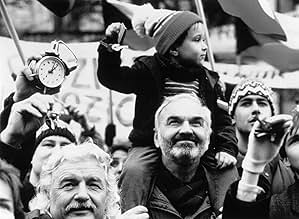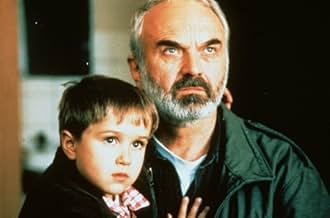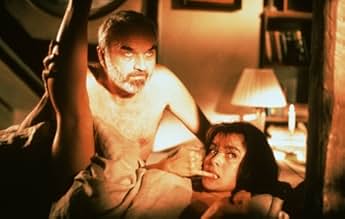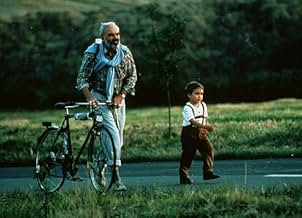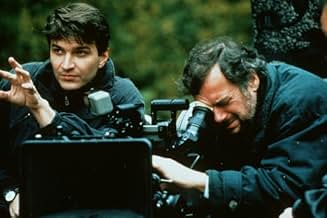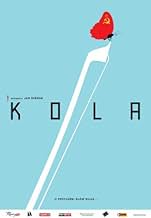AVALIAÇÃO DA IMDb
7,7/10
17 mil
SUA AVALIAÇÃO
Adicionar um enredo no seu idiomaA confirmed bachelor is in for the surprise of his life when a get-rich-quick scheme backfires and leaves him with a pint-sized new roommate.A confirmed bachelor is in for the surprise of his life when a get-rich-quick scheme backfires and leaves him with a pint-sized new roommate.A confirmed bachelor is in for the surprise of his life when a get-rich-quick scheme backfires and leaves him with a pint-sized new roommate.
- Direção
- Roteiristas
- Artistas
- Ganhou 1 Oscar
- 21 vitórias e 14 indicações no total
Zdenek Sverák
- Louka
- (as Zdeněk Svěrák)
Andrey Khalimon
- Kolja
- (as Andrej Chalimon)
Irina Bezrukova
- Nadezda
- (as Irina Livanova)
Liliyan Malkina
- Tamara
- (as Lilian Malkina)
Nela Boudová
- Brozová
- (as Nella Boudová)
- Direção
- Roteiristas
- Elenco e equipe completos
- Produção, bilheteria e muito mais no IMDbPro
Avaliações em destaque
10CBW-2
I did not think this film was at all sentimental (if you are using the word in its pejorative sense). In reading the comments on this film, I noticed the Czechs who responded were rather lukewarm about it. This surprises me. Kolya works as a film on several levels at once -- political, artistic, personal, etc. and I do not think it is at all predictable. The performances are magical and the entire film is encased by music of very great beauty and humanity by Dvorak and other great Czech composers. Music from Dvorak's "Four Biblical Songs" is at the heart of the film. It is the song that Klara sings at the funerals and the song Kolya is singing before and during the closing credits. The vintage film footage of Kubelik conducting Smetana's Ma Vlast at a concert at the end of the Russian occupation is a wonderful touch. Although I'm sure many other Czech films deserve Oscars, I am glad Kolya was recognized. I hope this film is released on DVD soon.
I watched this film last night on a open air cinema in Sundance and absolutely loved it!! The story is pretty simple and not very original, yet the film manages to be unique!! (it is very similar to the film Ponnette) But what I considered to be the best part of this movie was the little boy's performance. The kid is just the best kid actor I have seen in a long while. His acting not only is fabulous but REALLY touching and convincing.
I highly recommend this movie to anyone that wants to see a well made European movie that can make you laugh and cry at the same time.
I highly recommend this movie to anyone that wants to see a well made European movie that can make you laugh and cry at the same time.
It is 1988, and Czech bachelor Frantisek Louka is struggling to make ends meet. A talented cellist, his main source of employment is playing at the various crematoriums in Prague; though he'll do most work that comes his way. One day, a friend offers him the chance to earn a large amount of money through a sham marriage to a Russian lady, which would enable her- and her five-year-old son Kolya- to stay in Czechoslovakia. However, weeks after they are married, the woman uses her new citizenship to emigrate to West Germany, leaving Louka to look after a boy he barely knows.
A touching comic-drama, Jan Sverák's 'Kolya' tells a familiar tale; though tells it well. Rather like Takeshi Kitano's 'Kikujiro,' the film follows an unlikely father-figure who grows to love the ward in his charge, changing as a person as he does so. As Louka and Kolya become comfortable with one another, the narrative- written by Zdenek Sverák and based on an idea from Pavel Taussig- examines the importance of connection, detailing how one's life can be enriched by even the most unlikely of relationships.
A poignant character study, the film shows Louka's journey from a gruff, womanising cynic to someone with a greater appreciation for life- thanks to his experiences with Kolya. His time with the boy changes him for the better, and the film's bittersweet ending hints that he will never be the same. While not original on paper, the genuinely heartwarming story has a sardonic edge, while Sverák's screenplay abounds with thematic depth and irreverent, dry humour.
Additionally, the film can be seen as a reflection of the end of the Soviet occupation of Czechoslovakia, offering a nuanced critique of same, highlighting the tensions and ironies of the time. Most evidently, Louka's interactions with the Soviet bureaucratic system are emblematic of the inefficiencies and frustrations experienced by many Czechs under Soviet rule. His sham marriage to a Russian woman, and the subsequent responsibility of caring for her son, can be seen as a microcosm of the larger political dynamics at play. This relationship mirrors the complex, often strained interactions between Czechs and Russians during the occupation.
Moreover, the film poignantly portrays contextual conflicting attitudes towards Russians through its characters. For instance, Louka's initial reluctance to care for Kolya reflects a broader societal scepticism towards foreigners, particularly Russians, who were often viewed with suspicion and resentment at the time in occupied lands. Conversely, Louka's gradual transformation symbolizes a potential for reconciliation and understanding amidst political turmoil; paralleling his country's own path towards greater openness and eventual independence.
In addition, Vladimír Smutný's lush cinematography expertly captures Prague's beautiful melancholy, enhancing the narrative's depth and resonance. Smutný uses a rich colour palette and varied lighting to reflect the film's shifting moods. The muted tones and soft lighting in Louka's apartment convey a sense of isolation and mundanity, while the brighter, more vibrant scenes with Kolya highlight the boy's innocence and the joy he brings into his world. This visual contrast effectively underscores Louka's transformation throughout the film.
Smutný's cinematography also adeptly captures the essence of late 1980's Czechoslovakia, with a visual style reflecting the period's socio-political atmosphere. Many scenes subtly incorporate elements of Soviet influence and the impending change brought by the Velvet Revolution, which helps immerse one in the historical setting and reality of the narrative. Milos Kohout's art direction, as well as Katarina Hollá's costume design, only compounds this immersive realism, while Ondrej Soukup's stirring score drifts through the picture like a euphonious wind, heightening its emotional impact.
In addition to writing the screenplay, Zdenek Sverák stars as Louka, delivering a nuanced, grounded performance that is engaging and heartrending. His portrayal of Louka's transformation is subtle yet powerful, capturing the character's journey from cynic to father-figure astutely. Opposite him, Andrey Khalimon, as Kolya, lights up the screen, showing a natural acting ability, and the two work wonderfully together. Meanwhile, Libuse Safránková and Ondrej Vetchý excel in the supporting roles of Klara, one of Louka's girlfriends, and Broz, the friend whose actions get the narrative moving, respectively.
In short, though Jan Sverák's 'Kolya' tells a familiar tale, it tells it very well, and is memorable and moving both. Resonating on multiple levels, its narrative is engaging and its characters compelling. Boasting striking cinematography, as well as a fine score, it is routinely well-acted, especially by stars Zdenek Sverák and Andrey Khalimon. To put it simply, 'Kolya' is a bittersweet symphony that plucks at the heartstrings and plays all the right notes.
A touching comic-drama, Jan Sverák's 'Kolya' tells a familiar tale; though tells it well. Rather like Takeshi Kitano's 'Kikujiro,' the film follows an unlikely father-figure who grows to love the ward in his charge, changing as a person as he does so. As Louka and Kolya become comfortable with one another, the narrative- written by Zdenek Sverák and based on an idea from Pavel Taussig- examines the importance of connection, detailing how one's life can be enriched by even the most unlikely of relationships.
A poignant character study, the film shows Louka's journey from a gruff, womanising cynic to someone with a greater appreciation for life- thanks to his experiences with Kolya. His time with the boy changes him for the better, and the film's bittersweet ending hints that he will never be the same. While not original on paper, the genuinely heartwarming story has a sardonic edge, while Sverák's screenplay abounds with thematic depth and irreverent, dry humour.
Additionally, the film can be seen as a reflection of the end of the Soviet occupation of Czechoslovakia, offering a nuanced critique of same, highlighting the tensions and ironies of the time. Most evidently, Louka's interactions with the Soviet bureaucratic system are emblematic of the inefficiencies and frustrations experienced by many Czechs under Soviet rule. His sham marriage to a Russian woman, and the subsequent responsibility of caring for her son, can be seen as a microcosm of the larger political dynamics at play. This relationship mirrors the complex, often strained interactions between Czechs and Russians during the occupation.
Moreover, the film poignantly portrays contextual conflicting attitudes towards Russians through its characters. For instance, Louka's initial reluctance to care for Kolya reflects a broader societal scepticism towards foreigners, particularly Russians, who were often viewed with suspicion and resentment at the time in occupied lands. Conversely, Louka's gradual transformation symbolizes a potential for reconciliation and understanding amidst political turmoil; paralleling his country's own path towards greater openness and eventual independence.
In addition, Vladimír Smutný's lush cinematography expertly captures Prague's beautiful melancholy, enhancing the narrative's depth and resonance. Smutný uses a rich colour palette and varied lighting to reflect the film's shifting moods. The muted tones and soft lighting in Louka's apartment convey a sense of isolation and mundanity, while the brighter, more vibrant scenes with Kolya highlight the boy's innocence and the joy he brings into his world. This visual contrast effectively underscores Louka's transformation throughout the film.
Smutný's cinematography also adeptly captures the essence of late 1980's Czechoslovakia, with a visual style reflecting the period's socio-political atmosphere. Many scenes subtly incorporate elements of Soviet influence and the impending change brought by the Velvet Revolution, which helps immerse one in the historical setting and reality of the narrative. Milos Kohout's art direction, as well as Katarina Hollá's costume design, only compounds this immersive realism, while Ondrej Soukup's stirring score drifts through the picture like a euphonious wind, heightening its emotional impact.
In addition to writing the screenplay, Zdenek Sverák stars as Louka, delivering a nuanced, grounded performance that is engaging and heartrending. His portrayal of Louka's transformation is subtle yet powerful, capturing the character's journey from cynic to father-figure astutely. Opposite him, Andrey Khalimon, as Kolya, lights up the screen, showing a natural acting ability, and the two work wonderfully together. Meanwhile, Libuse Safránková and Ondrej Vetchý excel in the supporting roles of Klara, one of Louka's girlfriends, and Broz, the friend whose actions get the narrative moving, respectively.
In short, though Jan Sverák's 'Kolya' tells a familiar tale, it tells it very well, and is memorable and moving both. Resonating on multiple levels, its narrative is engaging and its characters compelling. Boasting striking cinematography, as well as a fine score, it is routinely well-acted, especially by stars Zdenek Sverák and Andrey Khalimon. To put it simply, 'Kolya' is a bittersweet symphony that plucks at the heartstrings and plays all the right notes.
8=G=
"Kolya", an award winning Czech film set in Prague, is a sweet and sentimental story about a boy (the title character) and a male cellist who, through circumstance, becomes his guardian. Set against a backdrop of Czech countryside and the architecture of Prague, this well crafted and wistful tale is a worthwhile 100 minute watch for those in need of relief from the numbing excesses of Hollywood blockbusters. Potentially enjoyable by all, "Kolya" will be most appreciated by mature audiences, particularly those who favor European films.
I like this movie very much and I am glad to read that most of you like it too. However, some comments here describe it as predictable and having the funny parts far from one another. It is not true. There are two more things that you cannot appreciate: 1) The background. I am a Czech myself and I remember the times which the film speaks about. There are many little details that probably come and go unnoticed for the foreigner eye but each of them is a symbol - it carries meaning that is so obvious for a Czech viewer. 2) The language is FUNNY! Sverak (the author) is a well known writer here. He is a GENIUS with the language, it's full of sweet little word puns that can never be translated into another language. You can translate the data, the information - but you lose the atmosphere. Believe me, even in the parts that look boring, there is something hidden between the lines - it's either funny, emotional, powerful... There is another great thing with playing with the differences between Czech and Russian. The languages are similar (to some extend) but there are differences that can result in misunderstandings - and they use it in the movie too. Czech people used to learn Russian language at schools so they can appreciate it.
I am so sorry that there is no way that you could enjoy even these parts of the movie. (Unless you'd want to learn Czech of course :-)
Just please, please, bear in mind that this is not just a shallow romantic movie. Yes, it is lovely - but there is more than that.
I am so sorry that there is no way that you could enjoy even these parts of the movie. (Unless you'd want to learn Czech of course :-)
Just please, please, bear in mind that this is not just a shallow romantic movie. Yes, it is lovely - but there is more than that.
Você sabia?
- CuriosidadesThe child actor who plays Kolja, Andrey Khalimon, was not cast until three weeks before filming started.
- Erros de gravaçãoThroughout the movie, many background cars are clearly newer than 1989 models. The film is set in 1989.
- ConexõesFeatured in 54th Golden Globe Awards (1997)
Principais escolhas
Faça login para avaliar e ver a lista de recomendações personalizadas
- How long is Kolya?Fornecido pela Alexa
Detalhes
- Data de lançamento
- Países de origem
- Central de atendimento oficial
- Idiomas
- Também conhecido como
- Kolya
- Locações de filme
- Empresas de produção
- Consulte mais créditos da empresa na IMDbPro
Bilheteria
- Faturamento bruto nos EUA e Canadá
- US$ 5.770.254
- Faturamento bruto mundial
- US$ 5.770.254
- Tempo de duração1 hora 51 minutos
- Cor
- Mixagem de som
- Proporção
- 1.66 : 1
Contribua para esta página
Sugerir uma alteração ou adicionar conteúdo ausente

Principal brecha
What is the Mexican Spanish language plot outline for Kolya, uma Lição de Amor (1996)?
Responda

